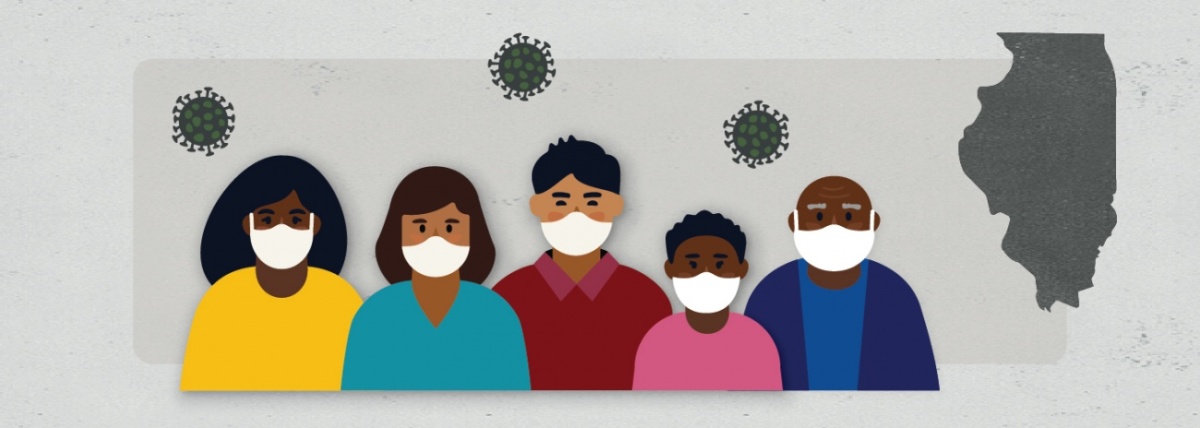In Illinois, PIH Shares Global Contact Tracing Expertise
A statewide response rooted in equity, accompaniment
Posted on Sep 30, 2020

Contact tracing is about much more than mapping the spread of COVID-19. It’s about lending a listening ear, communicating health information, and connecting people with the social support—such as food and housing—they need to quarantine safely. But contact tracers can’t provide this level of care without an underlying public health strategy and systems rooted in equity.
In Illinois, Partners In Health seeks to support just that. PIH is advising the Illinois Department of Public Health as it scales a contact tracing program to meet the unique needs of the communities it serves.
“Our first priority shouldn’t be, ‘How do we solve the simplest cases?’” says Ameet Salvi, PIH’s project lead in Illinois. “It should be, ‘How do we support the most complex and difficult ones? How do we design a program and implement it in a way that doesn’t leave the vulnerable as an afterthought?’”
PIH began working in Illinois in May, when Illinois Gov. JB Pritzker’s Office requested help after seeing the success of PIH’s contact tracing work in Massachusetts and learning about its U.S. Public Health Accompaniment Unit (PHAU). The unit, which grew out of PIH’s Massachusetts work, provides technical advising to states, counties, and cities across the U.S. as they fight COVID-19. It also serves as an open-source hub of information and best practices for public health leaders. So far, PHAU is assisting over 10 U.S. partners--from Newark, N.J. to Pima County, Ariz. --with their pandemic response.
For Illinois, PIH’s advisory team has been an important part of the state advisory team as local health officials scale up a statewide contact tracing program.
‘A Microcosm of the Country’
Since mid-July, with the progression of summer and the state’s reopening, Illinois’ case count has been slowly rising. The state’s experience in some ways reflect challenges nationwide, as states across the country reopen to varying levels and as the pandemic has spread from urban centers, hit hard in the Spring, to more rural areas as the summer has progressed.
“In some ways, Illinois is a microcosm of the country as a whole,” says Trent Fuenmayor, PIH’s project manager in Illinois.
Drawing on its global experience fighting infectious diseases, PIH is advising state health officials as they hammer out the nuts and bolts of scaling up a statewide contact tracing program—establishing protocols, developing training materials, and refining public health messaging. For many state employees, these duties come on top of their usual job functions.
Mounting a statewide contact tracing program is no small task for Illinois, where the health system is decentralized and spans 97 local health departments. Involving the community, says Dr. Regan Marsh, is key.
“Everything about COVID needs to be hyperlocal,” says Marsh, a clinical technical advisor for PIH’s work in Illinois and Newark, N.J.. “Even the person giving the training needs to have local recognition. It needs to be from the community.”
“Contact tracing is essential to slowing the spread of COVID-19,” said Illinois Department of Public Health Director Dr. Ngozi Ezike. “Illinois is a large and diverse state ranging from highly populated urban areas like Chicago, to more sparsely populated rural areas like Red Bud. We want people to know we are working to protect everyone’s health and we need everyone’s cooperation to do that. Working with PIH has helped inform the best way to build a contact tracing infrastructure so we can reach all of our communities across Illinois.”
And equity is essential. COVID-19 has disproportionately affected communities of color across the U.S., who were already marginalized by decades of systemic racism. Such disparities have emerged in Illinois, too.
In Chicago, Black, non-Latinx cases account for 42.6% of COVID-19 deaths. Latinx residents have the highest infection rate statewide. These disparities emerge due to structural inequities such as housing discrimination, lack of access to health care, higher levels of air pollution, and overrepresentation in essential jobs with little to no workplace protections.
“The people who are already marginalized are also the ones who are going to be the most impacted by this disease and need the most tailored equity support,” says Fuenmayor.
On a practical level, that could mean doubling the number of care resource coordinators—the core staff who connect patients with housing, food, and financial assistance—in areas that are particularly hard hit. It also means making sure that contact tracers represent the racial, ethnic, cultural and linguistic diversity of the communities most affected.
Social support—from meal delivery to rental assistance—is key to creating the conditions necessary for quarantine and stopping the spread. It’s also a core part of PIH’s care delivery, proven to be effective throughout decades of global experience fighting infectious diseases, from Ebola in Sierra Leone to tuberculosis in Peru.
Marsh and Salvi previously worked in Sierra Leone during the Ebola response, where they saw first-hand the need for contact tracing efforts to stem from the community and connect people with the resources they need to survive.
They draw upon their global experience as they advise Illinois health officials launching a statewide contact tracing program amid a pandemic that evolves by the day. The accompaniment that threads through PIH’s work around the world guides their work in Illinois.
“There’s a lot of important learning from the global south for the north, especially now during Covid,” says Marsh, who is also an emergency medicine physician and PIH’s director of clinical systems. “Public health in the U.S. has been terribly under-resourced for decades.”
“The conversations are difficult, and the problems entangled and entrenched,” says Salvi. “But we’re giving our partners that vote of reassurance: ‘This is going to be messy; get ready for it. We’re going to be there by your side to help you get through it.’”

